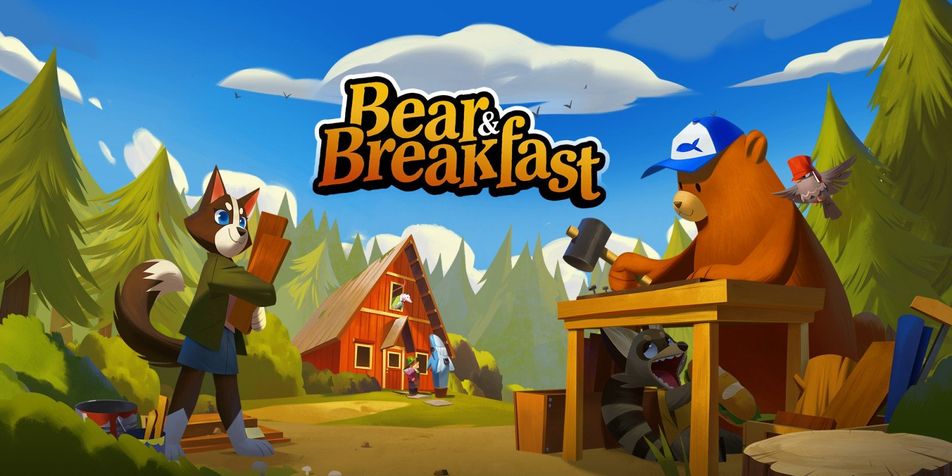Bear And Breakfast
Let’s talk about Stardew Valley for a moment.
Stardew Valley is a farm sim game. You play as an urban escapee, leaving your big city-slicker life and burnout behind to take over your grandfather’s farm in Stardew Valley. You start small, with just a few patches of crops squeezed between trees, but gradually grow into an automated agricultural behemoth. Along the way, you befriend the denizens of Stardew Valley, perhaps finding romance, or perhaps discovering the platonic joy that is Krobus, and help the valley stand up against the scourge of Joja Corp (this is the only correct ending). You learn to fish, how to forage, and how to slash your way through dungeons, and in the end, you build something that you can be immensely proud of. You turn a swath of wild and untamed forest into a junimo sweatshop home.
Okay, now let’s talk about Bear and Breakfast.
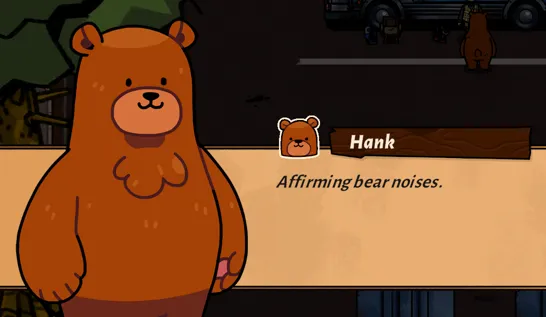 It’s not you, Hank. It’s me.
It’s not you, Hank. It’s me.
Bear and Breakfast is a casual crafting game. You play as Hank, who, inspired by a talking shark, decides to turn the rubble-laden sheds in his forest into thriving bed and breakfasts or resorts. You start small, with a shed and a couple of cots, but gradually grow into a resort behemoth. Along the way, you meet the various denizens of the forest, learning their stories and the greater story of why your forest is the way it is. You learn to craft, to cook, and to build, and in the end, build a series of resorts that you can be proud of, full of glowing reviews and smiling guests. You turn a swath of wild and untamed forest into a home.
I’m being a bit tongue-in-cheek. Stardew Valley and Bear and Breakfast are very different games. However, I think the spectre of Stardew Valley looms low over the entire casual management and casual crafting genre. I’ve seen it in games like Cat Cafe Manager , but it’s also present here. There’s this desire to make a game about something as simple as tending a farm or managing a cafe or building a series of resorts something more profound than it is, while also missing what made Stardew Valley so successful in the first place. There’s a desire to recapture that magical moment and make something that explodes into the collective psyche, but it’s lightning that’s difficult to recapture.
Much like in my Antioch: Scarlet Bay where I compared Antioch: Scarlet Bay to Disco Elysium, this is not to say every game needs to be a paragon of its genre to be successful. Stardew Valley, like Disco Elysium, is a classic, and not every game has to be it. However, when an entire genre of games have shifted to try to capture what made Stardew Valley so successful, it’s worth considering why that might be, and what they’re missing.
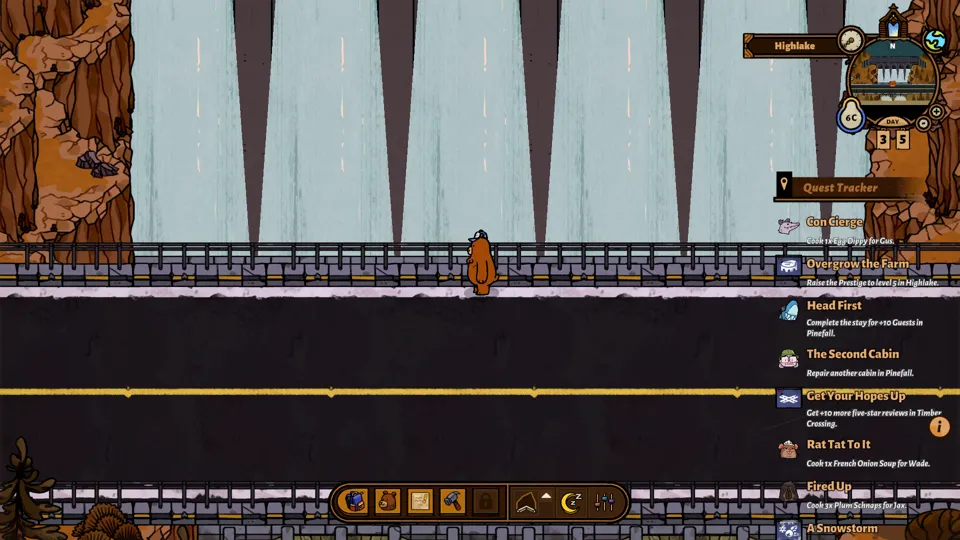 Hank has thoughts. Deep thoughts.
Hank has thoughts. Deep thoughts.
There is a lot of Bear and Breakfast that is enjoyable and unique. Bear and Breakfast not only centers around designing and furnishing small resorts, but around crafting. Much of the game’s time is spent roaming through the forest, harvesting the ingredients to make furniture, food, and whatever a thriving resort needs.
However, this is both a blessing and a curse. Thematically, it’s deeply sweet to see a resort grow almost solely out of what can be found in the forest. It is a wonderful ethos of reuse and viewing the world through the lens of the wild. The forest itself, though, is not dynamic enough to support the ethos of the forest as a home. The forest itself is unchanging. Except for resources spawning, there’s nothing new to see or experience in the forest. Once all locations are unlocked, there isn’t much new to explore. Quests can be progressed, but these quests are extensions of crafting. They are what the player would have done anyway, and so don’t provide any meaningful sense that the forest or Hank are progressing.
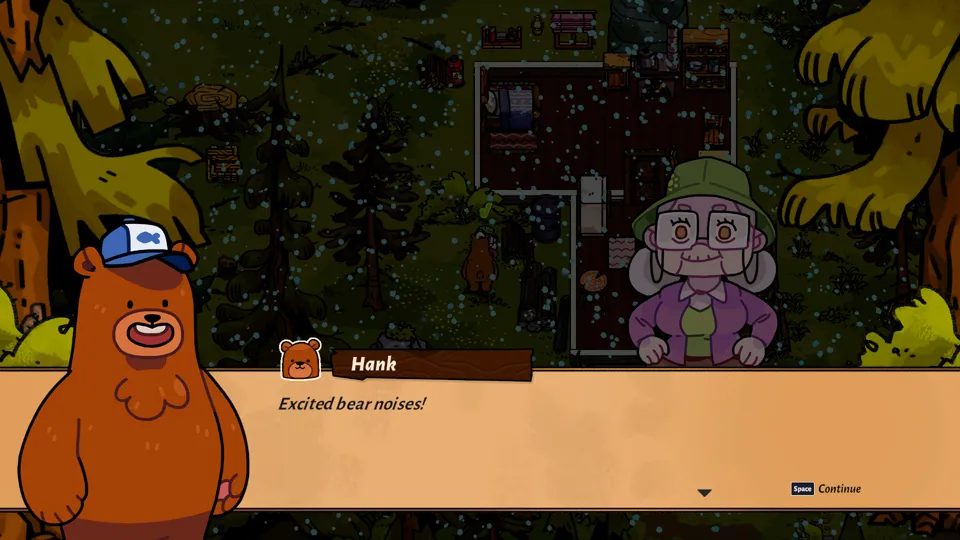 Oh, Hank, you poor dumb lump.
Oh, Hank, you poor dumb lump.
The crafting mechanic itself is also flawed in its implementation. While the idea of gathering resources and using them to craft new things is far from a unique one, both Bear and Breakfast’s crafting and inventory management systems are frustrating. Stacks of items can only be moved one stack at a time, and don’t automatically stack. This leads to a tedious experience of scrolling through the space already taken up in a storage container, hunting for a like object to stack with. Cooking food either makes one stack of a food or all stacks of a food, with the act of cooking taking twelve seconds, regardless of what or how much is being made.
Perhaps most confusingly, crafted items can’t be recycled or sold, and must instead be tossed out into the aether. This runs counter to the themes that make the game endearing and the idea of building a forest bed and breakfast from found items. It means as well that there is a disincentive to fully build rooms when you’re close to unlocking a new item tier. Those resources won’t be recycled or reused - they’re just lost.
Bear and Breakfast also relies on that fundamental element of crafting games, namely that idea that the player’s creativity governs the end product. While there is some room for creativity, the fixed size and layout of buildings and the furniture within them, as well as the minimum requirements for each room means that, rather than each bed and breakfast being unique, every room looks the same, taking as much advantage of limited space as possible with the same furniture in every room. The challenges the game puts forth are also what make it frustrating. If we are to craft, let the players craft rather than setting out a blueprint for the correct design.
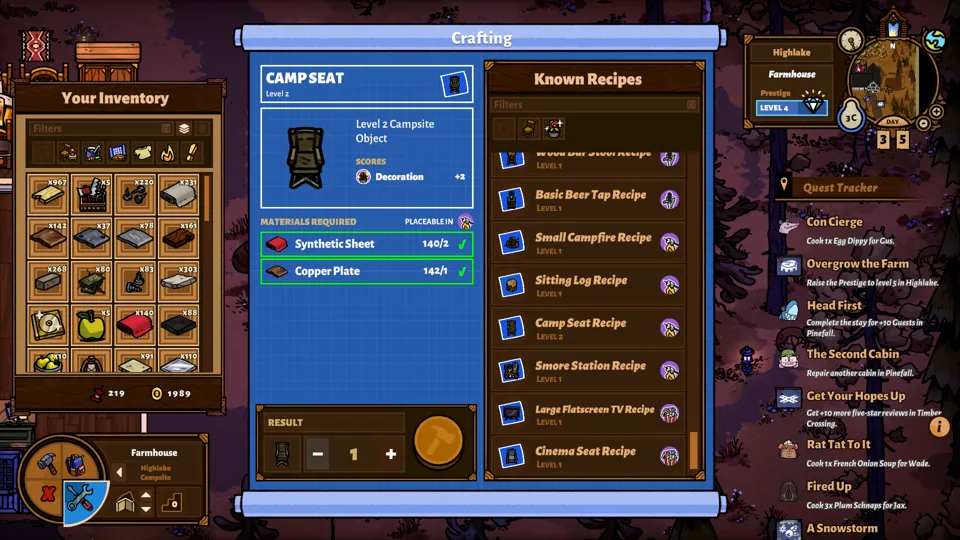 Not that I’m short on resources, but that’s not the point.
Not that I’m short on resources, but that’s not the point.
This is the true lesson that games that seek to be Stardew Valley haven’t learned. There are elements of Stardew Valley I find frustrating. My house has limited space, and there are ideal layouts for crops or barrels or animals. I am not very good at the combat elements, and I will never make it to the bottom of the mummy’s tomb before the end of the day.
But there are enough other things going on in the game that I don’t care about the things I’m not good at or the elements that can be frustrating. Instead, I can be drawn in by those things that work and that appeal to me, and they carry me through the more tedious bits.
Once the initial thrill of exploration wears off, Bear and Breakfast is nothing but the tedious bits. It’s nothing but wandering a forest, scouring for resources, and assigning people to rooms. I ride the bus in loops, refilling buffet tables and cleaning up trash without ever feeling like I’m doing something meaningful. Rooms become impossible to upgrade due to space, and all I’m left with is a nearly non-existent story.
This game has its moments. The characters are cute, and the idea undergirding it is a solid one. However, in trying to be a crafting game, it misunderstands what makes crafting interesting and fun. In trying to be a forest commune game, it misunderstands what makes that sort of story compelling. In trying to be a management game, it puts too little agency in the hands of the manager, and too much emphasis on tedious gameplay loops.
I wanted to love this game. I briefly did. However, once I got a few hours in and realised where I was, I couldn’t love it anymore. All I saw was repetitiveness, when what I wanted was a cute bear in a forest.
Developer: Gummy Cat
Genre: Crafting, Casual
Year: 2022
Country: Romania
Language: English
Play Time: 25-30 Hours
Youtube: https://youtu.be/QvLTRXO-ySY
